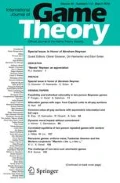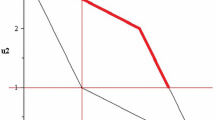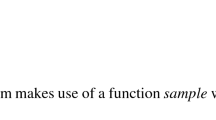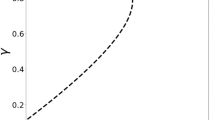Abstract.
Limiting inspection to publicly correlated strategies linearizes the problem of finding subgame perfect equilibria for indefinitely repeated Prisoners' Dilemmas. Equilibrium strategies satisfy a matrix inequality; the matrix depends on the duration of the punishment mechanism. The existence of subgame perfect equilibria is determined by comparing a parameter of the stage game to the spectral radius of the matrix. The spectral radii are found for the matrices associated with every possible duration of punishment.
Quasifinite continuation probabilities are defined to be the set of continuation probabilities where the sole subgame perfect equilibrium is noncooperative for any Prisoners' Dilemma stage game. The defining property of quasifinite continuation probabilities is determined by a common factor of the different spectral radii. Additional properties of quasifinite continuation probabilities are examined.
Similar content being viewed by others
Author information
Authors and Affiliations
Additional information
Received: January 1996/final version: January 1999
Rights and permissions
About this article
Cite this article
Jones, M. The effect of punishment duration of trigger strategies and quasifinite continuation probabilities for Prisoners' Dilemmas. Game Theory 28, 533–546 (1999). https://doi.org/10.1007/s001820050124
Issue Date:
DOI: https://doi.org/10.1007/s001820050124




